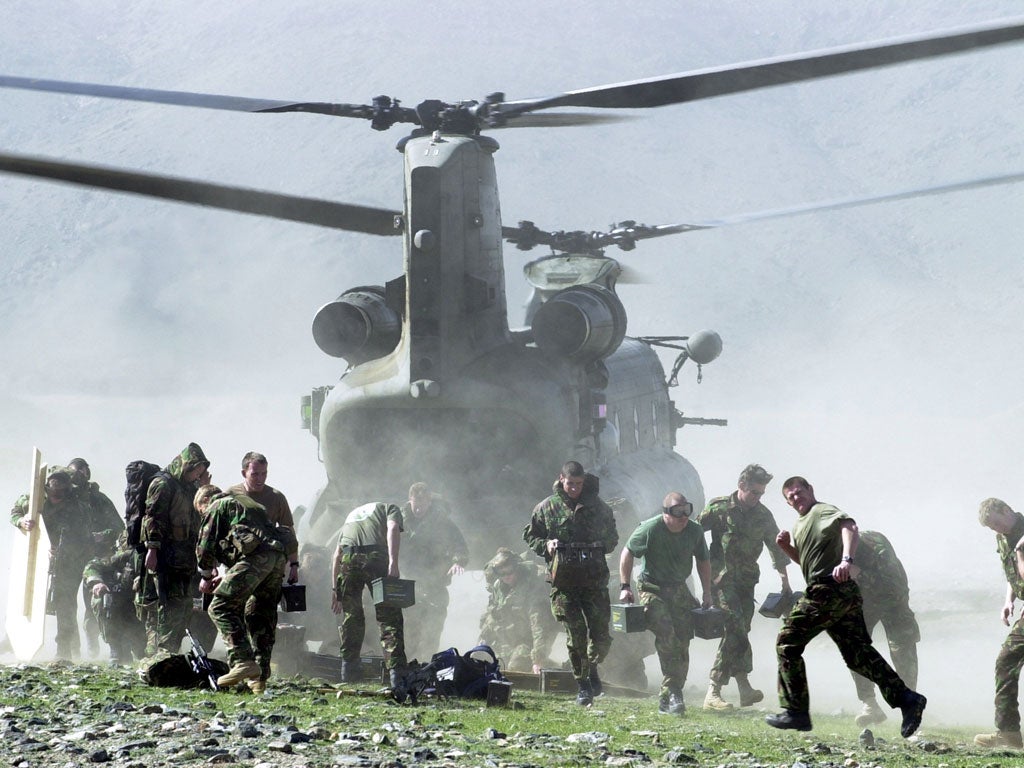Troops' injury claims show 20-fold rise
Iraq and Afghan conflicts have led to more than 28,000 military personnel seeking MoD help for health problems since 2006

Your support helps us to tell the story
From reproductive rights to climate change to Big Tech, The Independent is on the ground when the story is developing. Whether it's investigating the financials of Elon Musk's pro-Trump PAC or producing our latest documentary, 'The A Word', which shines a light on the American women fighting for reproductive rights, we know how important it is to parse out the facts from the messaging.
At such a critical moment in US history, we need reporters on the ground. Your donation allows us to keep sending journalists to speak to both sides of the story.
The Independent is trusted by Americans across the entire political spectrum. And unlike many other quality news outlets, we choose not to lock Americans out of our reporting and analysis with paywalls. We believe quality journalism should be available to everyone, paid for by those who can afford it.
Your support makes all the difference.The hidden costs of war in Iraq and Afghanistan have been laid bare by official figures revealing soaring numbers of troops appealing for financial support after sustaining injuries in combat.
A breakdown of requests for help from the Ministry of Defence has revealed that more than 28,000 service personnel have made compensation claims in the last six years to help them cope with problems such as amputations and mental illness.
The latest annual toll of claims is 20 times the figure recorded in 2005/06, when the compensation scheme was established. The department has handed out £125m in tax-free lump-sum payments to compensate for the "pain and suffering" endured by servicemen and women wounded in Iraq or Afghanistan.
Military experts last night warned that the costs of the conflicts would not shrivel away when UK forces finally withdraw from their battle against the Taliban – scheduled for the middle of next year – as thousands of badly injured personnel would need specialist healthcare for the rest of their lives.
NHS officials have warned the Government that they will have to deal with "a surge in the number of combat amputees with complex needs leaving the armed forces" in the next decade.
Adrian Weale, of the British Armed Forces Federation, said: "The MoD has made considerable strides in developing services for wounded veterans, but we still think that they can do better. We would like to see a system of lifetime care much closer to that of the US Veterans Administration, for those who have ongoing health problems as the result of service. The reality is that health issues caused by military service tend to get worse with the passage of time, and we suspect that this will be an issue for many years."
The number of claims registered under the Armed Forces Compensation Scheme rose from 365 in 2005/06 to 7,350 in 2010/11, the last full year for which figures are available. However, almost 4,500 personnel entered claims in the first six months of last year alone. More than 3,000 of these came from people whose injuries meant they had to leave the forces.
Some 1,305 former personnel received full guaranteed income payments (GIPs) – designed to help support the wounded for the rest of their lives – 265 of them for amputations.
In a report for the Government last year, the Conservative MP and former Royal Navy surgeon Andrew Murrison warned that the increased use of improvised explosive devices in Afghanistan meant the UK should prepare for some 20 new military amputees every year for at least a decade. Many more would be leaving the services and passing into the care of the NHS.
The NHS is also braced to care for many more personnel who have not yet appealed for medical help, notably those who may suffer post-traumatic stress disorders as a result of experiences in the combat zone.
Only 10 people have been awarded both a GIP and a lump-sum payment for service-related mental illnesses since 2005, while 505 more have received lower lump sums after their mental-health problems were adjudged less severe. The charity Combat Stress has warned that 50,000 British service personnel could develop mental health problems in the future.
The organisation's director of medical services, Dr Walter Busuttil, said: "Serving personnel will often focus on overcoming a physical injury first, so their mental health problems may not surface until years later."
An MoD spokesman said the department took its responsibility to ensure injured personnel "get the support they need" very seriously. He added: "If personnel sustain an injury caused by service, we encourage them to claim and receive their full entitlements under the scheme."
Join our commenting forum
Join thought-provoking conversations, follow other Independent readers and see their replies
Comments